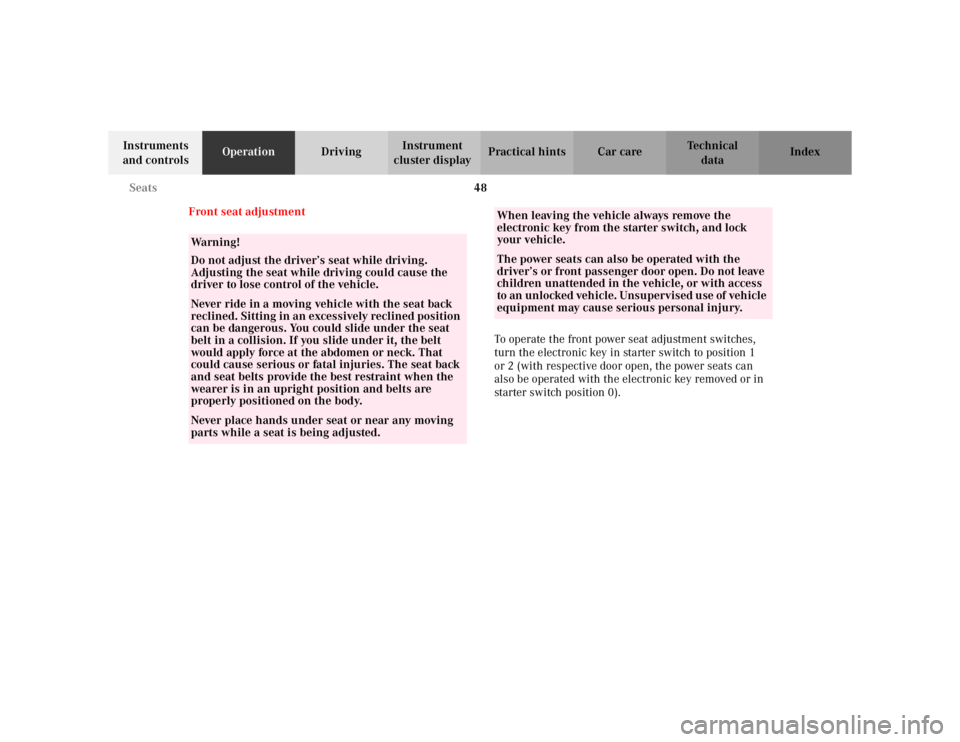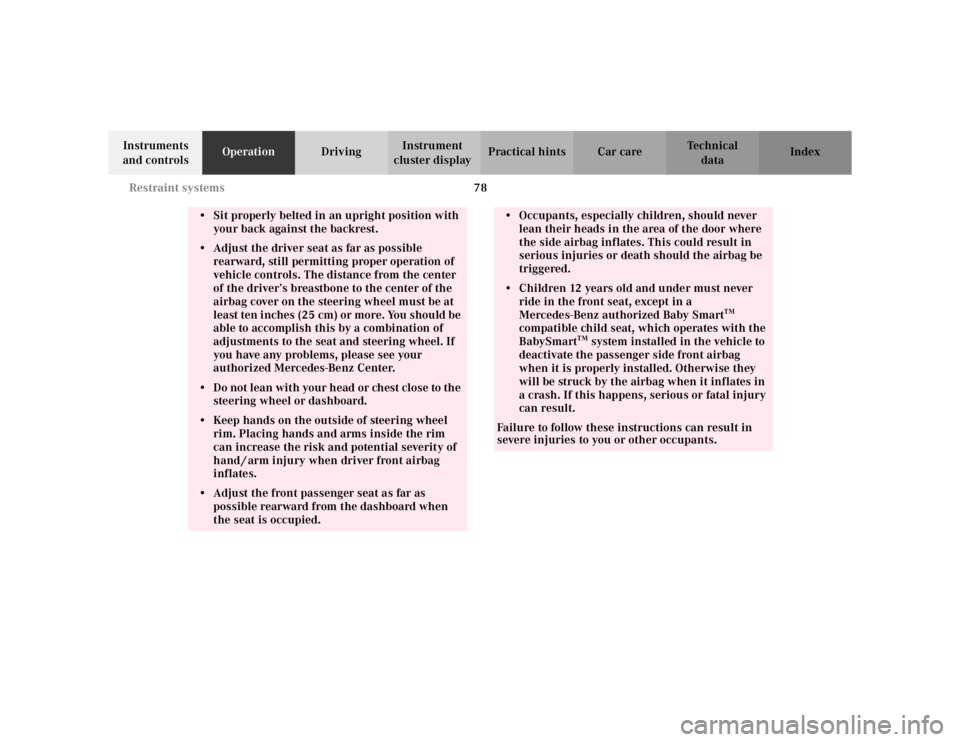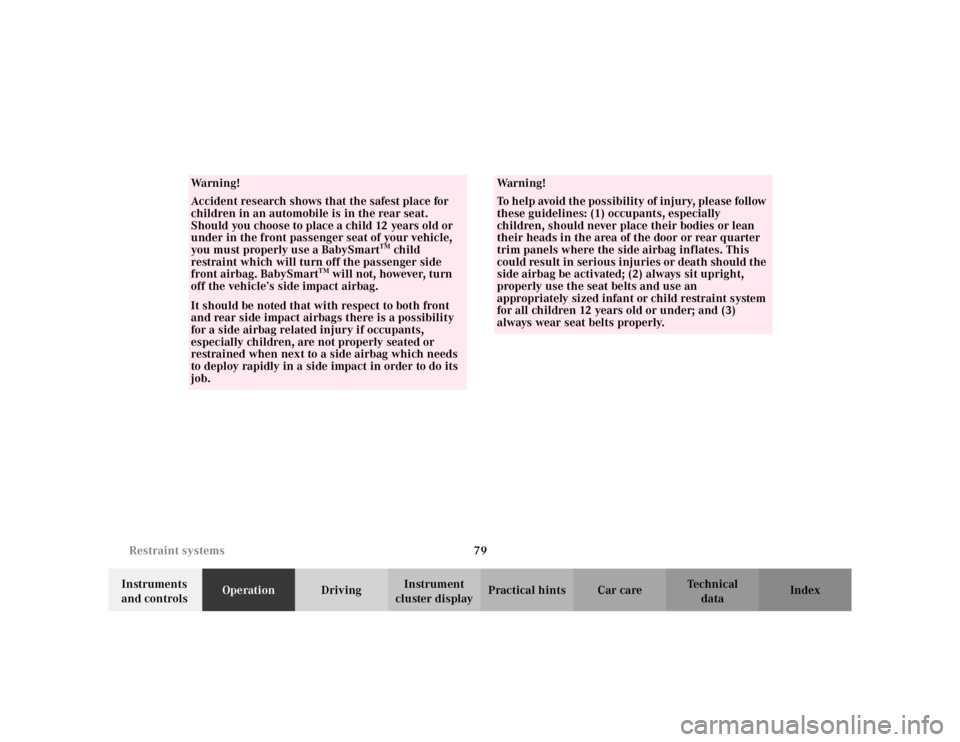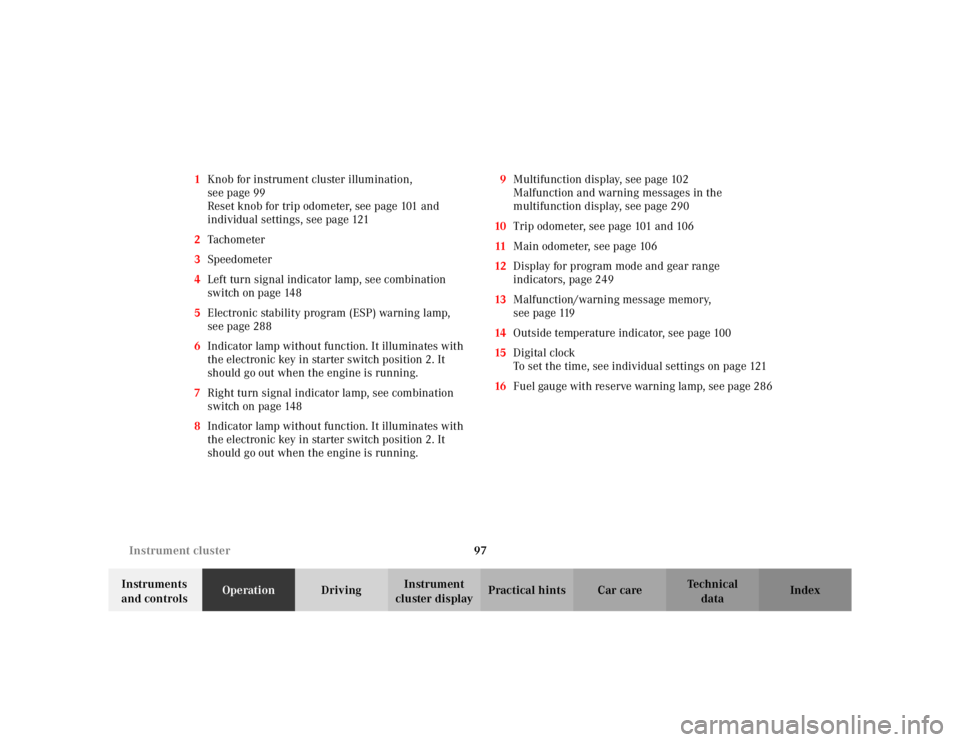ESP MERCEDES-BENZ C CLASS COUPE 2002 Owners Manual
[x] Cancel search | Manufacturer: MERCEDES-BENZ, Model Year: 2002, Model line: C CLASS COUPE, Model: MERCEDES-BENZ C CLASS COUPE 2002Pages: 399, PDF Size: 16.59 MB
Page 6 of 399

3
Contents Maintenance ................................... 227
Tele Aid............................................ 228
Catalytic converter......................... 238
Emission control ............................ 239
Starter switch ................................. 240
Starting and turning off
the engine .................................. 242
Manual transmission .................... 244
Automatic transmission................ 246
Parking brake ................................. 256
Driving instructions ...................... 257 Drive sensibly – Save Fuel........ 257
Drinking and driving................. 257
Pedals ........................................... 257
Power assistance ........................ 258
Brakes .......................................... 258
Driving off ................................... 259
Parking ........................................ 260
Tires ............................................. 261
Snow chains ................................ 263
Winter driving instructions ...... 264
Deep water .................................. 266
Passenger compartment............ 267
Traveling abroad......................... 267 Cruise control ................................ 268
Brake assist system (BAS)............ 271
Antilock brake system (ABS)....... 272
Electronic stability program
(ESP) ........................................... 274
What you should know at the gas station ...................... 278
Check regularly and before a long trip .................................. 280
Instrument cluster displayMalfunction and indicator
lamps in the instrument
cluster......................................... 282
On-board diagnostic system......... 283 Check engine malfunction
indicator lamp ............................ 283
Brake warning lamp .................. 284
Supplemental restraint
system (SRS) indicator lamp .... 285
Fuel reserve warning ................ 286
ABS malfunction indicator
lamp ............................................. 287 Electronic stability program
(ESP) — warning lamp ............... 288
Seat belt nonusage warning lamp ............................................288
Malfunction and indicator lamp in the center console ...... 289
AIRBAG OFF indicator lamp..... 289
Malfunction and warning messages in the
multifunction display ............... 290
DISPLAY DEFECTIVE ................ 291
BATTERY / ALTERNATOR........ 292
ANTILOCK BRAKE SYSTEM..... 293
BRAKE ASSIST ........................... 293
BRAKE PAD WEAR .................... 294
BRAKE FLUID ............................. 294
PARKING BRAKE ....................... 295
SEAT BELT SYSTEM................... 295
ELEC. STABIL. PROG.
(Electronic stability program) .. 296
COOLANT (coolant level) .......... 297
COOLANT
(coolant temperature) ................ 298
ENGINE OIL LEVEL ................... 299
Page 10 of 399

7
Introduction Product information
Kindly observe the following in your own best interest:
We recommend using Mercedes-Benz original parts as well as conversion parts and accessories
explicitly approved by us for your vehicle model.
We have tested these parts to determine their reliability, safety and their special
suitability for Mercedes-Benz vehicles.
We are unable to make an assessment for other products and therefore cannot be held responsible
for them, even if in individual cases an official approval or authorization by governmental or other
agencies should exist. Use of such parts and accessories could adversely affect the safety, performance
or reliability of your vehicle. Please do not use them.
Mercedes-Benz original parts as well as conversion parts and accessories approved by us are available
at your authorized Mercedes-Benz Center where you will receive comprehensive information, also on
permissible technical modifications, and where proper installation will be performed.
Page 27 of 399

24
Instruments and controls
Te ch n i c a l
data
Instruments
and controls Operation Driving
Instrument
cluster display Practical hints Car care Index
Center console 1Left front seat heater switch, see page 58
2 ESP (electronic stability program) control switch, ,
see page 274
3 Hazard warning flasher switch, see page 151
4 Central locking switch, see page 38
5 Antitheft alarm system, see page 44
Switch for tow-away protection, see page 46
6 Right front seat heater switch, see page 58
7 AIRBAG OFF indicator lamp, see page 289
8 COMAND system (optional), see separate
operating instructions, or
audio system, see page 173
9 Climate control, see page 152
Automatic climate control, see page 160
Rear window defroster, see page 170
P68.20-2457-27
2
3
4
56
78913
Page 39 of 399

36
Central locking system
Te ch n i c a l
data
Instruments
and controls Operation
DrivingInstrument
cluster display Practical hints Car care Index
Doors
1 Opening – pull handle
2 Unlocking driver’s door
3 Locking driver’s door
Important!
The mechanical key does not operate the central locking
system or antitheft alarm system. 4
Individual door from inside:
Push lock button down to lock.
5 Individual door from inside:
Pull handle to unlock.
When you lock the driver’s door with the mechanical
key, the door lock button should move down.
Each individual door must be locked with the respective
door lock button – the driver’s door can only be locked
when it is closed.
P72.10-2314-26
1
2
3
4
5
P72.10-2316-26
Page 51 of 399

48
Seats
Te ch n i c a l
data
Instruments
and controls Operation
DrivingInstrument
cluster display Practical hints Car care Index
Front seat adjustment
To operate the front power seat adjustment switches,
turn the electronic key in starter switch to position 1
or 2 (with respective door open, the power seats can
also be operated with the electronic key removed or in
starter switch position 0).
Wa r n i n g !
Do not adjust the driver’s seat while driving.
Adjusting the seat while driving could cause the
driver to lose control of the vehicle.Never ride in a moving vehicle with the seat back
reclined. Sitting in an excessively reclined position
can be dangerous. You could slide under the seat
belt in a collision. If you slide under it, the belt
would apply force at the abdomen or neck. That
could cause serious or fatal injuries. The seat back
and seat belts provide the best restraint when the
wearer is in an upright position and belts are
properly positioned on the body.Never place hands under seat or near any moving
parts while a seat is being adjusted.
When leaving the vehicle always remove the
electronic key from the starter switch, and lock
your vehicle. The power seats can also be operated with the
driver’s or front passenger door open. Do not leave
children unattended in the vehicle, or with access
to an unlocked vehicle. Unsupervised use of vehicle
equipment may cause serious personal injury.
Page 81 of 399

78
Restraint systems
Te ch n i c a l
data
Instruments
and controls Operation
DrivingInstrument
cluster display Practical hints Car care Index
• Sit properly belted in an upright position with
your back against the backrest.• Adjust the driver seat as far as possible rearward, still permitting proper operation of
vehicle controls. The distance from the center
of the driver’s breastbone to the center of the
airbag cover on the steering wheel must be at
least ten inches (25 cm) or more. You should be
able to accomplish this by a combination of
adjustments to the seat and steering wheel. If
you have any problems, please see your
authorized Mercedes-Benz Center.• Do not lean with your head or chest close to the steering wheel or dashboard.• Keep hands on the outside of steering wheel rim. Placing hands and arms inside the rim
can increase the risk and potential severity of
hand / arm injury when driver front airbag
inflates.• Adjust the front passenger seat as far as possible rearward from the dashboard when
the seat is occupied.
• Occupants, especially children, should never
lean their heads in the area of the door where
the side airbag inflates. This could result in
serious injuries or death should the airbag be
triggered.• Children 12 years old and under must never ride in the front seat, except in a
Mercedes-Benz authorized Baby Smart
TM
compatible child seat, which operates with the
BabySmart
TM system installed in the vehicle to
deactivate the passenger side front airbag
when it is properly installed. Otherwise they
will be struck by the airbag when it inflates in
a crash. If this happens, serious or fatal injury
can result.
Failure to follow these instructions can result in
severe injuries to you or other occupants.
Page 82 of 399

79
Restraint systems
Te ch n i c a l
data
Instruments
and controls Operation
DrivingInstrument
cluster display Practical hints Car care Index
Wa r n i n g !
Accident research shows that the safest place for
children in an automobile is in the rear seat.
Should you choose to place a child 12 years old or
under in the front passenger seat of your vehicle,
you must properly use a BabySmart
TM child
restraint which will turn off the passenger side
front airbag. BabySmart
TM will not, however, turn
off the vehicle’s side impact airbag.
It should be noted that with respect to both front
and rear side impact airbags there is a possibility
for a side airbag related injury if occupants,
especially children, are not properly seated or
restrained when next to a side airbag which needs
to deploy rapidly in a side impact in order to do its
job.
Wa r n i n g !
To help avoid the possibility of injury, please follow
these guidelines: (1) occupants, especially
children, should never place their bodies or lean
their heads in the area of the door or rear quarter
trim panels where the side airbag inflates. This
could result in serious injuries or death should the
side airbag be activated; (2) always sit upright,
properly use the seat belts and use an
appropriately sized infant or child restraint system
for all children 12 years old or under; and (3)
always wear seat belts properly.
Page 92 of 399

89
Rear view mirrors
Te ch n i c a l
data
Instruments
and controls Operation
DrivingInstrument
cluster display Practical hints Car care Index
Rear view mirrors
Inside rear view mirror
Manually adjust the mirror.
Inside rear view mirror, automatic antiglare
With the electronic key in starter switch position 2, the
mirror reflection brightness responds to changes in
light sensitivity.
With the gear selector lever in position “R”, or with the
interior light switched on, the mirror brightness does
not respond to changes in light sensitivity.
Note:
The automatic antiglare function does not react, if
incoming light is not aimed directly at sensors in the
mirror.
Wa r n i n g !
In the case of an accident liquid electrolyte may
escape the mirror housing when the mirror glass
breaks.Electrolyte has an irritating effect. Do not allow the
liquid come into contact with eyes, skin, clothing,
or respiratory system. In cases it does, immediately
flush affected area with water, and seek medical
help if necessary.
Page 95 of 399

92
Rear view mirrors
Te ch n i c a l
data
Instruments
and controls Operation
DrivingInstrument
cluster display Practical hints Car care Index
Driver’s side exterior rear view mirror,
antiglare mode
With the electronic key in starter switch position 2, the
mirror reflection brightness responds to changes in
light sensitivity.
With the gear selector lever in position “R”, or with the
interior light switched on, the mirror brightness does
not respond to changes in light sensitivity.
Note:
The automatic antiglare function does not react, if
incoming light is not aimed directly at sensors in the
inside rear view mirror. Important!
Electrolyte drops coming into contact with the vehicle
paint finish can only be completely removed while in
their liquid state, by applying plenty of water.
Wa r n i n g !
In the case of an accident liquid electrolyte may
escape the mirror housing when the mirror glass
breaks.Electrolyte has an irritating effect. Do not allow the
liquid come into contact with eyes, skin, clothing,
or respiratory system. In cases it does, immediately
flush affected area with water, and seek medical
help if necessary.
Page 100 of 399

97
Instrument cluster
Te ch n i c a l
data
Instruments
and controls Operation
DrivingInstrument
cluster display Practical hints Car care Index
1
Knob for instrument cluster illumination,
seepage99
Reset knob for trip odometer, see page 101 and
individual settings, see page 121
2 Tachometer
3 Speedometer
4 Left turn signal indicator lamp, see combination
switch on page 148
5 Electronic stability program (ESP) warning lamp,
see page 288
6 Indicator lamp without function. It illuminates with
the electronic key in starter switch position 2. It
should go out when the engine is running.
7 Right turn signal indicator lamp, see combination
switch on page 148
8 Indicator lamp without function. It illuminates with
the electronic key in starter switch position 2. It
should go out when the engine is running. 9
Multifunction display, see page 102
Malfunction and warning messages in the
multifunction display, see page 290
10 Trip odometer, see page 101 and 106
11 Main odometer, see page 106
12 Display for program mode and gear range
indicators, page 249
13 Malfunction/warning message memory,
seepage119
14 Outside temperature indicator, see page 100
15 Digital clock
To set the time, see individual settings on page 121
16 Fuel gauge with reserve warning lamp, see page 286